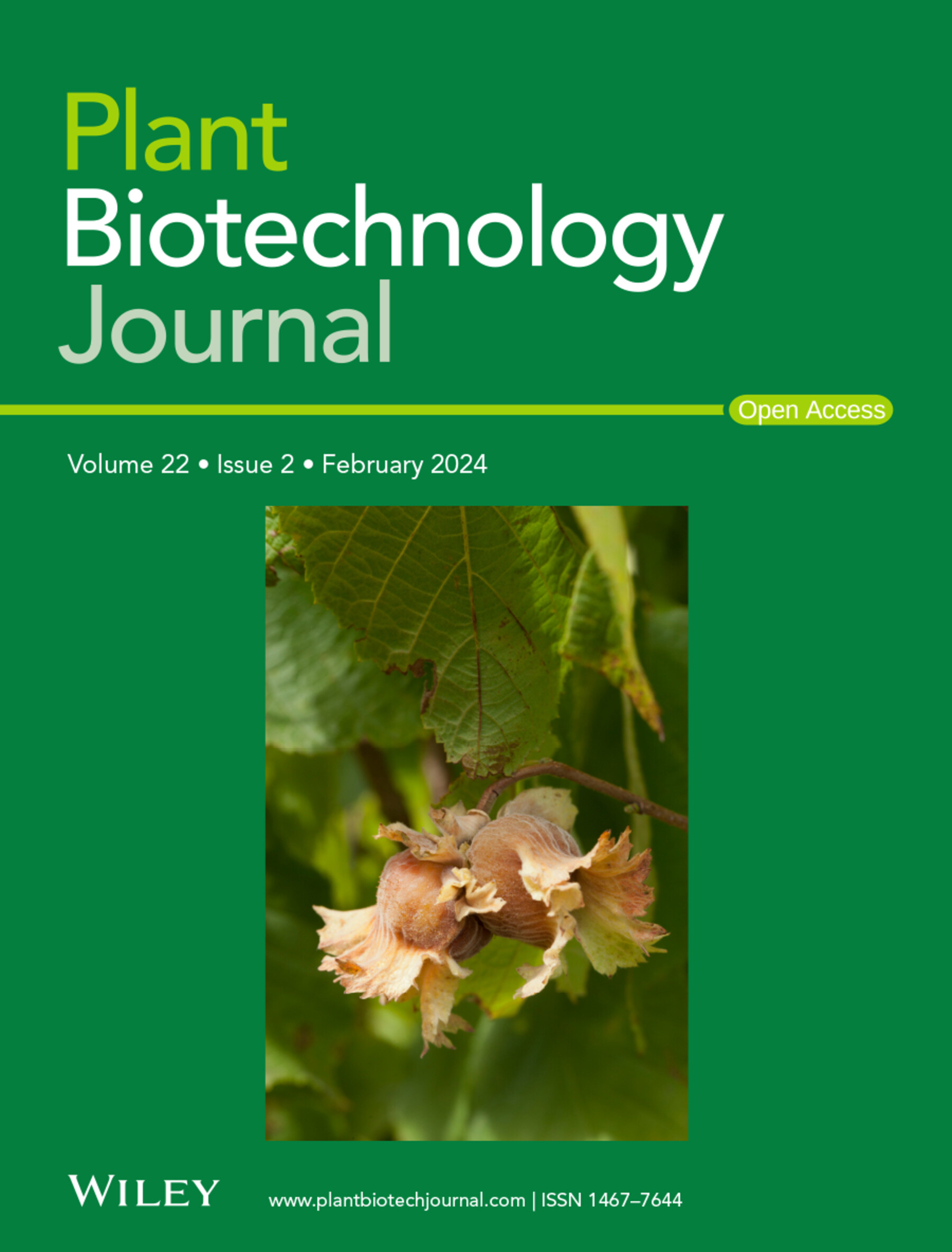乙烯响应因子LlERF092与LlETO1协同通过激活LlMBF1c提高百合的耐热性
IF 10.5
1区 生物学
Q1 BIOTECHNOLOGY & APPLIED MICROBIOLOGY
引用次数: 0
摘要
多蛋白桥接因子1c (MBF1c)已被证明在植物对热胁迫的反应中起关键作用。先前的研究表明MBF1c在乙烯介导的耐热性中起作用;然而,将MBF1c与这一过程联系起来的上游调控机制仍不清楚。在这项研究中,通过酵母单杂交筛选试验,乙烯反应因子(ERF) LlERF092被确定为LlMBF1c的潜在调节因子。进一步研究发现,LlERF092直接结合LlMBF1c的启动子并激活其转录。LlERF092被热应激快速诱导,其蛋白定位于细胞核。过表达LlERF092增强了转基因百合植株的耐热性。此外,免疫沉淀和质谱(IP‐MS)鉴定了LlETO1(乙烯过度生产者1)是LlERF092的相互作用伙伴。LlETO1的表达在瞬态热胁迫下被激活,LlETO1 - LlERF092互作增强了LlERF092的转录活性。LlERF092和LlETO1的共过表达比单独表达任何一个基因都更能增强耐热性,而LlERF092和LlETO1的共沉默比单独沉默每个基因更能降低耐热性。此外,热胁迫促进了百合叶片乙烯的产生,外源施用乙烯利增强了百合叶片的耐热性。乙烯利处理也提高了LlERF092、LlETO1和LlMBF1c的表达,而在热应激下,它们的表达被1‐MCP抑制。综上所述,这些研究结果表明,LlERF092/LlETO1‐LlMBF1c转录级联介导了热胁迫条件下百合的乙烯依赖性耐热性。该研究为植物热胁迫反应的分子机制提供了新的见解,并强调了乙烯信号在耐热性中的作用。本文章由计算机程序翻译,如有差异,请以英文原文为准。
An Ethylene‐Response Factor LlERF092 Coordinates With LlETO1 to Improve Thermotolerance by Activating LlMBF1c in Lily
Multiprotein bridging factor 1c (MBF1c) has been shown to play a critical role in plant responses to heat stress. Previous studies have implicated MBF1c roles in ethylene‐mediated thermotolerance; however, the upstream regulatory mechanisms linking MBF1c to this process remain unclear. In this study, an ethylene‐response factor (ERF), LlERF092, was identified as a potential regulator of LlMBF1c through a yeast one‐hybrid screening assay. Further investigations revealed that LlERF092 directly bound to the promoter of LlMBF1c and activated its transcription. LlERF092 was rapidly induced by heat stress, and its protein localised to the nucleus. Overexpression of LlERF092 enhanced the thermotolerance of the transgenic lily plants. Furthermore, immunoprecipitation followed by mass spectrometry (IP‐MS) identified LlETO1 (ETHYLENE OVERPRODUCER 1) as an interacting partner of LlERF092. The expression of LlETO1 was activated in response to transient heat stress, and the LlETO1‐LlERF092 interaction enhanced the transcriptional activity of LlERF092. Co‐overexpression of LlERF092 and LlETO1 enhanced thermotolerance more than the overexpression of either gene alone, while co‐silencing of LlERF092 and LlETO1 further reduced thermotolerance compared to silencing each gene individually. Additionally, heat stress promoted ethylene production in lily leaves, and exogenous application of ethephon enhanced thermotolerance. Ethephon treatment also elevated the expression of LlERF092 , LlETO1 , and LlMBF1c , while their expression was repressed by 1‐MCP under heat stress. In summary, these findings demonstrated that the LlERF092/LlETO1‐LlMBF1c transcriptional cascade mediated ethylene‐dependent thermotolerance in lily under heat stress conditions. This study provides new insights into the molecular mechanisms underlying plant heat stress responses and highlights the role of ethylene signalling in thermotolerance.
求助全文
通过发布文献求助,成功后即可免费获取论文全文。
去求助
来源期刊

Plant Biotechnology Journal
生物-生物工程与应用微生物
CiteScore
20.50
自引率
2.90%
发文量
201
审稿时长
1 months
期刊介绍:
Plant Biotechnology Journal aspires to publish original research and insightful reviews of high impact, authored by prominent researchers in applied plant science. The journal places a special emphasis on molecular plant sciences and their practical applications through plant biotechnology. Our goal is to establish a platform for showcasing significant advances in the field, encompassing curiosity-driven studies with potential applications, strategic research in plant biotechnology, scientific analysis of crucial issues for the beneficial utilization of plant sciences, and assessments of the performance of plant biotechnology products in practical applications.
 求助内容:
求助内容: 应助结果提醒方式:
应助结果提醒方式:


